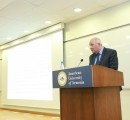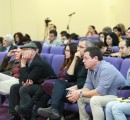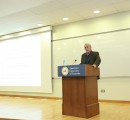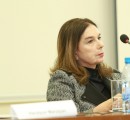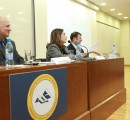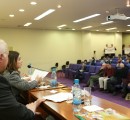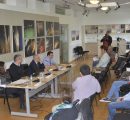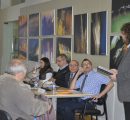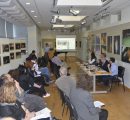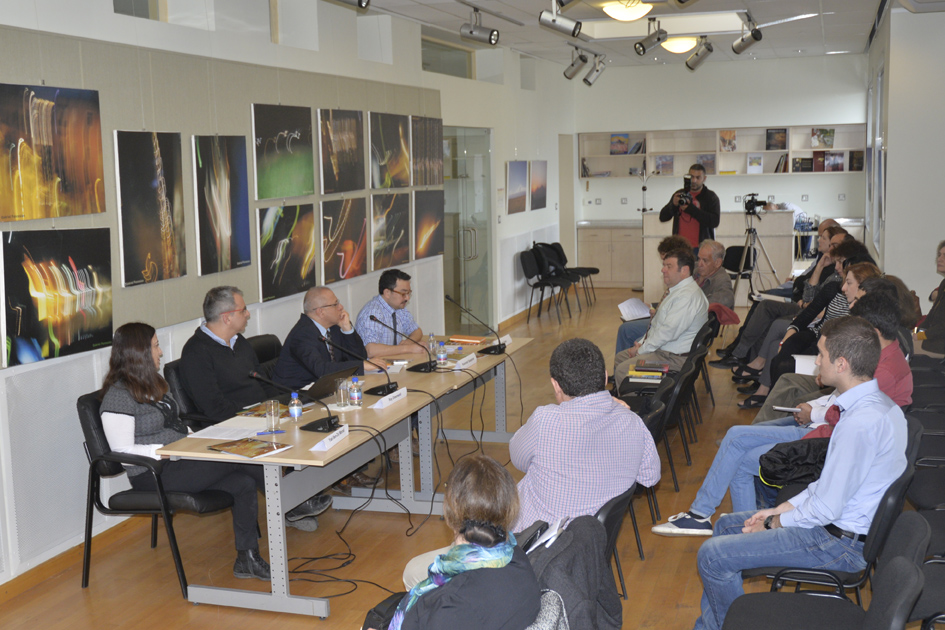
Learning How to Heal the Past and Deal with the Future: Israeli and Armenian Academics Share Ideas
4 min read“Knowing about the Armenian Genocide is part of my family, and with such similar fates between the two nations, it’s all around you in Israel.”
– Ora Ahimeir
Armenians and Israelis are haunted by a common experience of traumatic collective memory. On April 13th and 14th, Israeli literary scholars joined Armenian colleagues for a two-day colloquium entitled Genocide & Literature: Israeli and Armenian Comparative Perspectives, hosted by the American University of Armenia (AUA).
In his opening speech, AUA Visiting Professor Yair Auron, organizer of the colloquium and author of three books on the Armenian Genocide, spoke passionately about his concern over the conflicts of interest that currently exist between Armenia and Israel.
Auron, who is active in joint Armenian-Israeli academic events, condemned the recent tree planting ceremony in an Israeli forest to mark the alleged ‘genocide’ by Armenians in Khojaly. He expressed his disapproval of the Israeli Government’s participation in last year’s joint Turkish-Azerbaijani Khojaly commemoration, echoing his comments in an article published in Haaretz this month. Auron’s opening speech also addressed Israeli weapons sales to Azerbaijan and recent discussions in the Knesset to recognize the Armenian Genocide. Auron was unambiguous regarding both issues: “We are ashamed of the attitude of our country,” he said.
From the inception of Armenian academic institutions in the Diaspora in the 1950s, Jewish and Israeli scholars have had a major contribution to Armenian studies. AUA is taking steps to acknowledge the accomplishments of these scholars and has hosted a number of joint events with Israeli universities and academics, in line with its tradition of valuing scholarship and developing academic excellence through public forums and panel discussions on current issues. Under the shadow of the sale of Israeli weaponry to Azerbaijan, the two-day colloquium provided a platform for civil discussion around a range of political hot topics, and, importantly, a space to explore comparative perspectives.
The colloquium began with Ora Ahimeir, founder and former director of the Jerusalem Institute for Israel Studies, discussing the similarities between the Armenian and Israeli fates in an interview with students. She described: “Knowing about the Armenian Genocide is part of my family, and with such similar fates between the two nations, it’s all around you in Israel.”
Armenians in the Diaspora are well aware of the impact of Franz Werfel’s The Forty Days of Musa Dagh on Israeli soldiers in the 1940s as they returned to their homeland. “Every Jewish soldier was given the book for inspiration, and they even used passages from the novel for communications in secret code.” Ahimeir traced her journey as a literary scholar researching the experiences of women in genocide, and explained how she felt compelled to document the Armenian stories of horror and trauma. Building on the legacy of Werfel’s classic, Ahimeir’s latest novel, Refuge, to be released in October 2016, traces the fate of an Armenian woman who was saved by a Jewish family during the Genocide.
Dr. Harutyun Marutyan, leading researcher at the Department of Contemporary Anthropological Studies at the National Academy of Sciences of Armenia, also commented on the similarity between Armenian and Israeli history in his thought-provoking comparative lecture: “The Jewish and Armenian nations are often compared to one another due to their fate as victims.”
On the first evening of the colloquium, the visiting scholars from Israel were met with a silent protest by AUA students. They also responded to questions throughout the colloquium regarding the controversial sale of weaponry by Israel to Azerbaijan and on the recognition of the Armenian Genocide in the Knesset. Ahimeir lamented that “unfortunately relations between states are dictated by politics and political interests and not by morals.”
The second day of the colloquium, held at the AUA’s Akian Gallery, focused on the common Israeli and Armenian experience of traumatic collective memory. Scholarly works on genocide trauma, genocidal violence, and identity, as well as literary works on Jewish and Armenian persecution, were explored.
Haim Weis’s presentation, The Bar Kosibah Revolt, detailed the Jewish rebellion against the Roman Empire between 132 and 135CE, leading to the exile of the Jewish people. Many scholars consider this horrific chapter as the first genocide of the Jews. Weis’s research also revealed a connection between the story of the Revolt and the narrative of modern Zionism. As a point of comparison, Weis noted that the Revolt and the Armenian Genocide were the major turning points in Judean and Armenian history respectively, in both cases resulting in the expulsion of a people from their homeland.
Armenian students and Israeli scholars enjoyed robust discussion around the shared experience of victimhood and exile, laying the groundwork for future exchanges. Students were moved by the Israelis scholars’ sense of moral responsibility for seeking the recognition of the Armenian Genocide and for helping to heal the wounds of that tragedy.
Dr. Tom Samuelian, Dean of the College of Humanities and Social Sciences at AUA, continued with this theme, explaining that “Israelis see a shared experience” with Armenians. Samuelian, who was also present during the silent protest, commented that the Israelis panelists took the concerns of the protestors seriously, pointing out that the students “expressed their legitimate concerns about the political differences and, that the Israeli scholars, as individuals, were supportive of Armenian issues.” The Israeli scholars were, in turn, “highly impressed with the dignified way the AUA students expressed their grievances about Israeli policy toward Armenia and the Armenian Genocide.”
Auron was confident that Israel would soon recognize the Armenian Genocide. In his closing comments, he stated that: “These two days have been more about the experience of human beings and scholars.” He was pleased to announce that this colloquium is the first of many yet to come.

